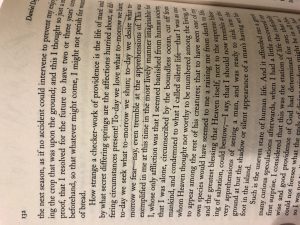“Today we love what tomorrow we hate; today we seek what tomorrow we shun; today we desire what tomorrow we fear”
This quotation from Daniel Defoe’s Robinson Crusoe essentially embodies the narrative of the protagonist, Robinson Crusoe. Crusoe’s desire for adventure led him away from a stable and prosperous lifestyle, both in England and in his Brazilian plantation. This desire to get away from his normal routine immediately fades away on the island and he craves his normal life again. He craves to see humans, civilization, and his family; the very things he attempted to get away from. Crusoe desired adventure and wanted to travel around the globe, yet he remained on one section of an island for a very long time and had periods of times where he did not want to leave his hut and cave. This is not a knock toward the character of Robinson Crusoe, but it is a reality and one that I believe Defoe wanted the reader to acknowledge.
Crusoe’s desire for adventure was not the only thing that flipped in the novel; his belief in god and religion were also susceptible to such changes as well. Prior to getting stuck on an island, Crusoe was not very religious, in fact, there were not even many references towards god at all. Despair combined with the fact that a bible was the only reading material that survived the wreck, led our protagonist to believe and worship a higher power. Throughout his time on the island, Crusoe struggled with his faith, often questioning why he survived the shipwreck and must struggle alone. It was interesting though that his curses also seemed to be his blessings; the fact that he survived that wreck could be construed as a blessing instead of a curse and Crusoe also got the adventure that he had been seeking as well. He also had a lot of luck with finding materials and supplies for surviving and the island itself offered much in terms of food and shelter. When Crusoe made it off of the island, his faith was not nearly as present and he even debated converting to a different religion just to live in Brazil.
While on the island, Crusoe craved human attention, and rightfully so. It is very difficult and even dangerous for a human to live alone for such an extended period of time, but his desire to see another human began to vanish when he considered the threat of cannibals. This fear prevented him from leaving his shelter some days and he hid from the humans that came on the island as well. As the quotation goes, what he sought yesterday, he no longer seeks today. 
